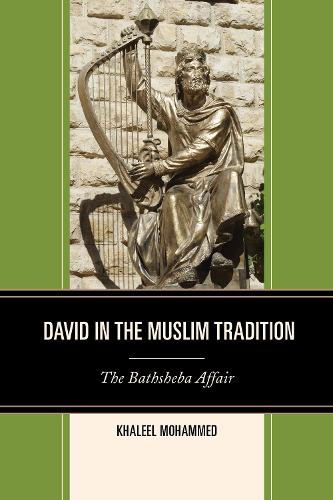
David in the Muslim Tradition: The Bathsheba Affair
(Hardback)
Publishing Details
David in the Muslim Tradition: The Bathsheba Affair
By (Author) Khaleel Mohammed
Bloomsbury Publishing PLC
Lexington Books
24th December 2014
United States
Classifications
Professional and Scholarly
Non Fiction
History of religion
Comparative religion
The Koran (Quran)
297.122
Physical Properties
Hardback
238
Width 164mm, Height 236mm, Spine 22mm
490g
Description
In Chapter 38:21-25, the Quran relates a very short narrative about the biblical King Davids seeking and receiving Gods forgiveness. The earliest Muslim exegetes interpreted the quranic verses as referring to the Hebrew Bibles story of Davids adultery with Bathsheba, as related in 2 Samuel 12:1-13. Later Muslims, however, having developed the concept of prophetic impeccability, radically reinterpreted those verses to show David as innocent of any wrongdoing since, in the Muslim tradition, he is not only a king, but a prophet as well. David in the Muslim Tradition: The Bathsheba Affair outlines the approach of the Quran to shared scriptures, and provides a detailed look at the development of the exegetical tradition and the factors that influenced such exegesis. By establishing four distinct periods of exegesis, Khaleel Mohammed examines the most famous explanations in each stratum to show the metamorphosis from blame to exculpation. He shows that the Muslim development is not unique, but is very much in following the Jewish and Christian traditions, wherein a similar sanitization of Davids image has occurred.
Reviews
Khaleel Mohammeds book, David in the Muslim Tradition.... helps to reveal the biblical subtext of the Qurn. Mohammed shows how Muslim interpretations shifted over time from acknowledging Davids sin, to granting it was a minor error, to finally absolving David of any transgression. Mohammed identifies three reasons for this shift in attitude: (1) an increasing skepticism toward material of Jewish and/or Christian origins (isrlyyt); (2) the rise of the doctrine of prophetic inerrancy (ima); and (3) the doctrine of the corruption of earlier biblical scriptures (tarf). He demonstrates that Islamic creedal principles and skepticism regarding other sources led to the declining importance of the Bible as a source for Muslim commentators. * Reading Religion *
Perhaps the greatest virtue of Mohammeds David in the Muslim Tradition is the clarity with which he demonstrates the increasing predominance of theological concerns in Muslim exegetical literature (tafsr) as he meticulously demarcates the major stages in the evolution of the traditional view of this episode. This approach is valuable because it shows exactly how early commentators ambivalence about the possibility that the Quran alludes to David committing a serious sin came to be superseded by an insistent denial of any significant wrongdoing at all on his part a metamorphosis from censure to exculpation (4). * Islam and Christian-Muslim Relations *
This is the first monograph study of the story of David in Islam. It is a masterful analysis of the image of King David in the Quranic exegetical tradition. This is a wonderful addition to the study of biblical figures in Islam, nuanced, sophisticated, and exhaustive. It is also a wonderful read. -- Walid Saleh, University of Toronto
Mohammed engages the broader subject of Islamic exegesis and breaks new ground in offering a detailed analysis of changing Muslim exegesis over time related to a key figure in all three Abrahamic faith traditions. This book will give readers unprecedented insight into the evolution of Muslim exegesis. It will appeal to readers interested in Islamic studies, Jewish studies, Qurnic studies, and Biblical studies, providing the depth and clarity needed to understand the complex workings of Muslim exegesis over time. -- Aisha Y. Musa, Colgate University
Author Bio
Khaleel Mohammed is professor of religious studies at San Diego State University.
